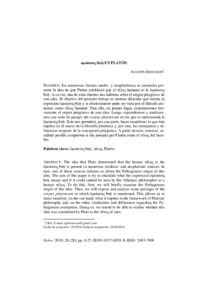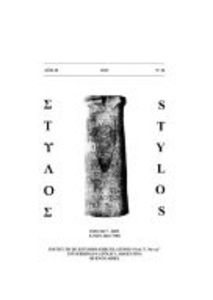Please use this identifier to cite or link to this item:
https://repositorio.uca.edu.ar/handle/123456789/9728| Título: | ὁμοίωσις θεῷ en Platón | Autor: | Brousson, Agustín | Palabras clave: | FILOSOFIA ANTIGUA; Platón, 427-347 a. C.; NATURALEZA HUMANA; FINALIDAD; HOMBRE | Fecha de publicación: | 2019 | Editorial: | Pontificia Universidad Católica Argentina. Facultad de Filosofía y Letras. Instituto de estudios grecolatinos "Prof. F. Nóvoa" | Cita: | Brousson, A. ὁμοίωσις θεῷ en Platón [en línea]. Stylos. 2019, 28. Disponible en: https://repositorio.uca.edu.ar/handle/123456789/9728 | Resumen: | Resumen: En numerosas fuentes medio- y neoplatónicas se encuentra pre-sente la idea de que Platón estableció que el τέλος humano es la ὁμοίωσις θεῷ. A su vez, una de estas fuentes nos informa sobre el origen pitagórico de esta idea. El objetivo del presente trabajo es intentar dilucidar qué mienta la expresión ὁμοίωσις θεῷ y si efectivamente pudo ser vista por el filósofo ateniense como τέλος humano. Para ello, en primer lugar, examinaremos brevemente el origen pitagórico de esta idea. Luego, expondremos y analizare-mos una serie de pasajes del corpus platonicum en los que es mencionada la ὁμοίωσις θεῷ. Esto nos permitirá, por una parte, hacer manifiesto lo que ésta implica en el marco de la filosofía platónica y, por otra, las semejanzas y diferencias respecto de la concepción pitagórica. A partir de esto, creemos, resultará posible comprobar si fue pensada por Platón como el τέλος del hom-bre. Abstract: The idea that Plato determined that the human τέλος is the ὁμοίωσις θεῷ is present in numerous medium- and neoplatonic sources. In turn, one of these sources informs us about the Pythagorean origin of this idea. The aim of this paper is try to elucidate what the expression ὁμοίωσις θεῷ means and if it could indeed be seen by the Athenian philosopher as a human τέλος. To do this, first, we will briefly examine the Pythagorean origin of this idea. Then, we will expose and analyze some passages of the corpus platonicum in which ὁμοίωσις θεῷ is mentioned. This allows us to make manifest, on the one hand, what it implies in the framework of Platonic philosophy and, on the other, similarities and differences regarding the Pythagorean conception. Doing so, we intend to be able to realize whether this idea was considered by Plato as the τέλος of men. |
URI: | https://repositorio.uca.edu.ar/handle/123456789/9728 | ISSN: | 0327-8859 (impreso) 2683-7900 (online) |
Disciplina: | LITERATURA | Derechos: | Acceso Abierto | Fuente: | Stylos. 2019, 28 |
| Appears in Collections: | STY - 2019 nro. 28 |
Files in This Item:
| File | Description | Size | Format | |
|---|---|---|---|---|
| telos-platon-agustin-brousson.pdf | 240,13 kB | Adobe PDF |  View/Open | |
| stylos28.jpg | 297,44 kB | JPEG |  View/Open |
Page view(s)
125
checked on Apr 30, 2024
Download(s)
174
checked on Apr 30, 2024
Google ScholarTM
Check
This item is licensed under a Creative Commons License

